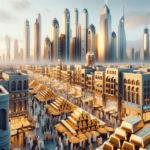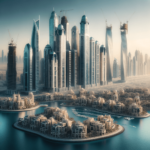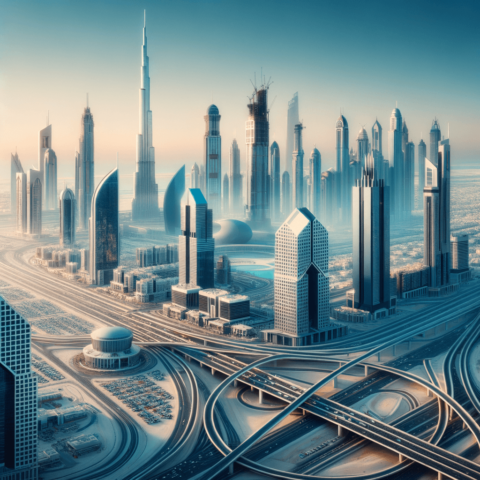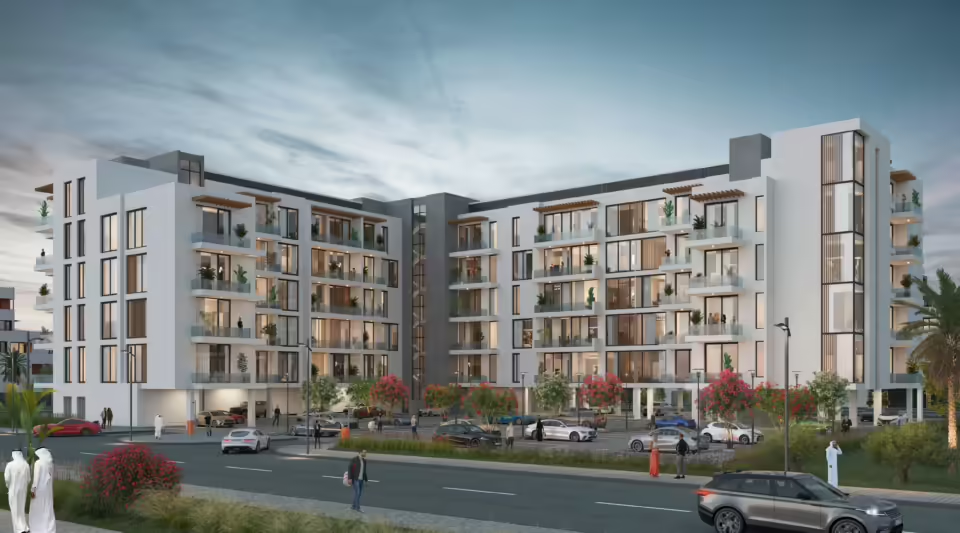
Latest Gold Rates & Market Dynamics in UAE
June 14, 2024
Investing in Dubai Real Estate: Exploring Off-Plan and Ready Properties
June 22, 2024Dubai, already a global hub, is witnessing unprecedented growth in its real GDP and tourism sector for 2024. The Central Bank of UAE has projected substantial economic outputs, attributing it to strong non-hydrocarbon growth and a booming tourism industry. This article explores the complete landscape of Dubai’s flourishing economy and tourism renaissance.
Dubai’s Projected Economic Growth
Dubai’s economy is set to surge with a projected real GDP growth of 3.9% in 2024 and an impressive 6.2% by 2025. This robust growth is driven by a remarkable uptick in non-hydrocarbon sectors and a marked increase in hydrocarbon activity. A multitude of factors contribute to this economic upswing, including strong foreign trade performance and strategic investments.
One of the critical components of this economic surge is Dubai’s ability to diversify its economy away from dependency on oil revenues. The focus on boosting non-hydrocarbon sectors has facilitated smoother transition and sustained growth. The Emirate has witnessed substantial investments in key areas expected to propel economic expansion. From infrastructure developments to business-friendly regulations, Dubai is ensuring its appeal to both domestic and international investors.
Moreover, strong foreign trade performance has been a cornerstone of Dubai’s economic policies. Leveraging its strategic geographical position, the Emirate serves as a global hub for trade and commerce, attracting an array of international businesses. Enhanced port facilities, state-of-the-art logistics services, and streamlined customs procedures contribute significantly to robust trade figures.
Strategic investments are another vital cog in Dubai’s economic machinery. Initiatives such as the Dubai Industrial Strategy 2030 and the Direct Foreign Investment (FDI) policies are designed to attract high-value investments and foster innovation. These moves not only inject capital into the economy but also create employment opportunities and stimulate sectoral growth.
By encouraging robust investment and maintaining an open trade environment, Dubai sets new benchmarks for economic prosperity in 2024 and beyond.
Non-Hydrocarbon Sector Performance
The non-hydrocarbon sector in Dubai is poised for significant growth, projected at 5.4% in 2024 and 5.3% in 2025. Several key sectors are driving this upward trajectory, spearheaded by initiatives and investments aimed at bolstering economic diversification and resilience.
Real Estate remains a cornerstone of Dubai’s economic ascension. With government-backed projects and robust foreign investment, the sector continues to flourish. Iconic developments such as the Dubai Urban Master Plan 2040 have laid the groundwork for sustainable urbanization, aiming to host a population of 5.8 million by 2040. Initiatives aimed at simplifying property transactions and bolstering investor confidence are also propelling growth, feeding into the broader ecosystem of economic activities.
The tourism and hospitality sector is another substantial contributor, buoyed by Dubai’s reputation as a global tourism hub. Innovative strategies like the Dubai Tourism Strategy 2025 focus on delivering unparalleled guest experiences and expanding the emirate’s offering through a mix of cultural, entertainment, and luxury attractions. The integration of cutting-edge technology in hospitality, such as AI-driven customer services, is revolutionizing the sector, making Dubai a preferred destination for tourists from around the globe.
Investment in the transportation sector is pivotal, aiming to enhance connectivity and alleviate congestion. The expansion of the Dubai Metro and the execution of massive infrastructure projects like the Hyperloop underline Dubai’s commitment to staying at the forefront of transportation innovation. Moreover, Dubai International Airport, already the world’s busiest, continues to upgrade its facilities to handle increased passenger traffic efficiently.
Through focused investments and forward-thinking policies, these key sectors are set to maintain their growth momentum, ensuring that Dubai’s non-hydrocarbon economy not only diversifies but thrives, reflecting the emirate’s ambition and strategic vision for the future.
Tourism’s Renaissance in Dubai
Tourism’s Renaissance in Dubai: Dubai remains a leading global tourism destination. The emirate saw a remarkable 11% increase in tourist arrivals in the first quarter of 2024. Dubai International Airport, the busiest globally, facilitated an 8.4% rise in passenger traffic. This chapter will examine these trends and the underlying factors such as upgraded infrastructure and key global connections.
Dubai’s tourism boost in 2024 is no coincidence—it’s the result of strategic planning and significant investments in infrastructure. The emirate has bolstered its appeal by upgrading existing landmarks and introducing new attractions that cater to diverse global tastes. The Dubai Mall, Burj Khalifa, and the Palm Jumeirah continue to attract millions, while newer projects like Museum of the Future and Dubai Harbour expand the horizon of tourist experiences.
Dubai International Airport’s 8.4% surge in passenger traffic is another significant factor. Ongoing enhancements in airport facilities and services ensure smoother transit and more enjoyable passenger experiences. Additionally, the introduction of new flight routes and increased connectivity to global cities have streamlined international travel, making Dubai more accessible than ever.
Innovative digital solutions also play a crucial role. From seamless visa processing to state-of-the-art mobile apps for navigating the city, technology enhances every aspect of a visitor’s journey. The hospitality sector, buoyed by expected growth and diversity, contributes significantly as well. Luxurious hotels, boutique stays, and an array of dining options accommodate the preferences of a wide range of tourists.
Moreover, Dubai’s reputation for safety and its proactive health measures have reassured travelers amidst global uncertainties, establishing the city as one of the safest destinations. Global events like Expo 2020’s lasting impact and recurring festivals continue drawing attention, ensuring sustained tourism growth.
The synergy of these elements not only drives urban economic resilience but also reinforces Dubai’s position as a premier global tourism destination, setting the stage for an even brighter future.
Impact of New Investments and Policies
The introduction of new investments and policies is serving as a robust pillar for Dubai’s economic fortification, further augmenting its status as a preeminent global hub. A striking example is the AED128 billion expansion project for Al Maktoum International Airport. This not only showcases Dubai’s ambition to cater to an increasing tourist influx but also underscores a strategic foresight aimed at boosting logistics and commercial aviation capabilities.
The ripple effect of such massive investments can already be observed in enhanced infrastructure that facilitates smoother transit and logistics operations. These developments create a business-friendly environment, attracting multinational corporations, startups, and SMEs alike. This influx of businesses diversifies the economic base, shifting reliance away from traditional sectors like oil, towards tourism, finance, and logistics.
Furthermore, affirmative policies aimed at easing business regulations and liberalizing the economy have been pivotal. Initiatives such as 100% foreign ownership in certain sectors and long-term residency visas for investors and skilled workers are not mere administrative changes but transformative policies driving sustained economic growth.
Innovative public-private partnerships have also spurred development in critical areas such as real estate and technology. These investments and policies synergize to foster an ecosystem where entrepreneurial ventures and large-scale industrial projects can thrive harmoniously.
In summation, the strategic infusion of capital and progressive policies is more than just an economic booster; it is an orchestrated effort to cement Dubai’s position as a nerve center for global commerce and innovation.
Real Estate and Employment Trends
Real estate in Dubai is experiencing a remarkable boom in 2024, with sales transactions skyrocketing, creating a positive ripple effect across the economy. This surge is driven by a dynamic mix of domestic and international buyers capitalizing on the robust market conditions. The positive real estate trends are further stimulated by recent government policies that favor foreign investment, simplify property transactions, and boost investor confidence.
As property prices rise, so does the wealth of homeowners and investors, leading to increased consumer spending. The influx of capital into the market is not only raising property values but also spurring the construction sector, which in turn is creating myriad job opportunities. The demand for skilled labor across construction, real estate services, and auxiliary sectors is rapidly increasing, contributing significantly to employment growth in the city.
Simultaneously, wages are seeing an upward trend, driven by the high demand for skilled professionals. Employment opportunities are broadening, with new positions emerging in fields such as property management, finance, and legal services tied to the real estate sector. This expanding job market is enhancing the economic stability and spending power of residents, fostering a cycle of domestic consumption that is pivotal for sustainable GDP growth.
In essence, the buoyant real estate market is creating a solid foundation for economic development. It is not only elevating the property sector but also invigorating the broader job market, ensuring that the economic benefits permeate various layers of society. This alignment between real estate growth and employment trends underscores a synergistic relationship that bolsters Dubai’s economic resilience and sets the stage for continued prosperity.
Conclusions
Dubai’s stellar economic growth and tourism resurgence are set to redefine its global stature. With strategic investments, robust sectoral growth, and enhanced infrastructure, Dubai is on the path to becoming an unparalleled destination for business and leisure. The future holds immense potential as Dubai continues to attract global attention and investments.





